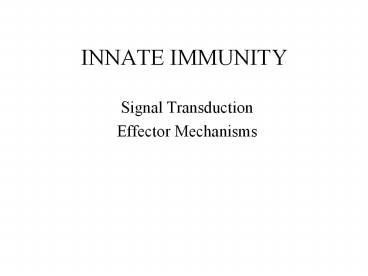INNATE IMMUNITY - PowerPoint PPT Presentation
1 / 33
Title:
INNATE IMMUNITY
Description:
INNATE IMMUNITY Signal Transduction Effector Mechanisms Innate Immunity:definition no need for prolonged induction no clonal expansion of Ag specificity act quickly ... – PowerPoint PPT presentation
Number of Views:466
Avg rating:3.0/5.0
Title: INNATE IMMUNITY
1
INNATE IMMUNITY
- Signal Transduction
- Effector Mechanisms
2
Innate Immunitydefinition
- no need for prolonged induction
- no clonal expansion of Ag specificity
- act quickly
- immediate direct response 0-4 hrs
- rapid induced 4-96 hrs
- failure gt adaptive immune response
- dependence on germ line encoded receptors
- high discrimination of host and pathogen
3
First Line of Defense -- Epithelia
- Mechanical
- tight junctions, air/fluid flow, ciliary
rejection - Chemical
- lysozyme, pH, defensins, surfactant opsonins,
TOX(ROX) - Microbiolgical
- normal protective flora competition,
antimicrobial colicin - Inductive
- receptors that recognize pathogens and signal
other innate and adaptive immune response
4
Cells of Innate Immunity
- Neutrophils
- Eosinophils
- Basophils/Mast Cells
- Monocytes
- Macrophages
- Natural Killer Cells
- Platelets
5
LEUKOCYTE TERMINOLOGYTwo Systems
- Nuclear Morphology
- Mononuclear Cells
- Monocytes/Macrophages
- Lymphocytes
- Polymorphonuclear Cells
- Polymorphonuclear Leukocytes, PMNLs, PMNs
- Granule Morphlogy
- Granulocytes
- Neutrophils (neutral), Eosinophils (orange),
Basophils (blue) - Agranulocytes
- Lymphocytes, Macrophages,
6
COMPARATIVE MORPHOLOGY OF GRANULOCYTES
7
Human Neutrophil
- Granulocytic Leukocyte
- Most Abundant White Blood Cell
- 2-6 x 103 cells/µL
- 40 75 of leukocytes
- Very Short Lifetime
- t1/2 6 hours
- 55 of Bone Marrow Weight Devoted to Neutrophil
Production
8
- Human Neutrophil Size
- In Peripheral Blood Smear
- 12 15 µm diameter
9
Human Neutrophil Size
- In blood
- Volume 300 µm3 sphere (300 fl vs. 90 fl for
RBC) - Diameter 8.3 µm
10
NEUTROPHIL EM MORPHOLOGY
11
EOSINOPHIL EM MORPHOLOGY
12
BASOPHIL/MAST CELL EM MORPHOLOGY
13
Signal Transduction
- Receptors
- recognition of pathogens
- chemical signals
- Transduction pathways
- G proteins, Kinases
- Effector activation
- gene induction
- motility, secretion
- adherence, phagocytosis
14
Three Types of Receptors
ACh receptor
Chemotaxis receptor
Growth factor receptor
15
G protein-coupled receptors
- Largest receptor family appx 1000 types
- Bind proteins, peptides, absorb light
- Highly homologous in structure
- G??? protein exchange factors
- G protein splitters gt G?-GTP G??
- Primary transducers are G?-GTP G??
- Activate membrane phospholipases and cyclases
16
FPR mutations affecting ligand binding rendered
in CPK
HII - L78A HIII - D106A(N), L109A HIV -
T157A HV - R201A, I204A, R205A HVI - W254A,
Y257A HVII - F291A
17
FPR and G Protein Functional Interaction
18
G Protein Cycle
19
(No Transcript)
20
GPCR OF INNATE IMMUNITY
- Peptide receptors
- fMLF receptor-- chemotaxis toward bacteria
- Complement receptors C5a, C3a -- chemotaxis
toward sites of complement activation - Lipid receptors
- Leukotriene (LTB4), Eiosanoid (LPXA4), PAF, PG
- Chemokine receptors
- CXC (IL-8), CC (MCP), CXXXC(Fractalkine)
- nomenclature from amino terminal cysteines
- IL-8, MCP induce extravasation of neuts, M?
- Fractalkine - monocyte /endothelial adhesion
21
Enzyme Associated Receptors
- Growth factor-like receptors
- Cytokine receptors
- Adherence/Phagocytosis receptors
- Integrins
- Selectins
- FcR
- Pattern/Pathogen recognition receptors
- Mannose/Glucan receptors
- LPS receptor
- Scavenger
- Complement
- Toll receptors
22
Enzyme-associated Receptors
23
Mechanism of TK Receptors
24
Primary Transduction by TK Receptors
25
Mechanisms of Cytokine Receptors
26
Primary Transducers of Cytokine Pathways
- Non-receptor protein tyrosine kinases
- Janus Kinase (JAK) family
27
Primary Transducers of Pattern Recognition
Receptor Pathways
- Non-receptor protein tyrosine kinases
- Src family Fc-mediated Phagocytosis
- Igene familyTyrActivation Motif phosphorylation
(YXXL) - p72Syk?Syk kinase
- MyD88 IL-1R-like Toll receptors
- Serine threonine Immunity Kinase
- P130cas FocalAdhesionKinasevinculin, talin
integrin-mediated
28
Adhesin Mechanism
29
Phagocytosis
30
FcR-mediated PhagocytosisThree types of FcR
- Fc?RI(CD64)
- monocytes, M?. IF?-stim neutrophils
- high affinity binds monomeric IgG
- Fc?RII (CD32) AB forms
- low affinity binds to multimeric IgG
- A - phagocytic and NK cells
- B - B/T cells
- Fc?RIII (CD16)
- monocytes, M?, neutrophils
- GPI anchored
- Garcia-Garcia et al JLB 721092,2002
31
FcR-mediated Phagocytosisearly events
- Receptors clustered by geometry of binding
- ITAMs phosphorylated by Src Y kinases
- Small fraction of active Src kinases associated
w/cytoplasmic domains - Fgr,Fyn, Hck, Lyn,Yes, Src
- Pi ITAM dock SH2 domain of Syk(Y-Kin)
- Syk maybe need for actin cup formation
32
Syk Downstream SignalingCalcium? PKC-S/T
Kinases - 11types ? PLA ? AA release (Ca
dep/ind) PLC ?Ca release PLD ?Activ PKC via
DAG PI-3K ?PIP2, PIP3 PHs(Vavs) ?
Pseudopod extension ERK ?S/T Knse MAPK1(aka)
(nucl. transcription factor activation) PKC_at_PM
w/Raf1 SMGs?CDC42, Rac, Rho? 50 GEFs(Vav
w/PHs) WASPs/Arps PAK ?LIMK ?Cofilin
33
Midterm Questions
- 1. Choose a receptor that mediates directed
motility. Trace the events that may lead to
formation of pseudopods that extend in the
appropriate directions. Make sure that you cover
the SMGs and how they participate and what
regulates their participation. Describe key
points of evidence? Do innate immune cells differ
from B T cells in this function? - 2. Compare and contrast inflammatory and
apoptotic phagocytosis. Name names, identify key
regulatory points, be clear about SMG
participation








![Immunity [M.Tevfik DORAK] PowerPoint PPT Presentation](https://s3.amazonaws.com/images.powershow.com/P1254413703joFem.th0.jpg?_=20210623114)






















